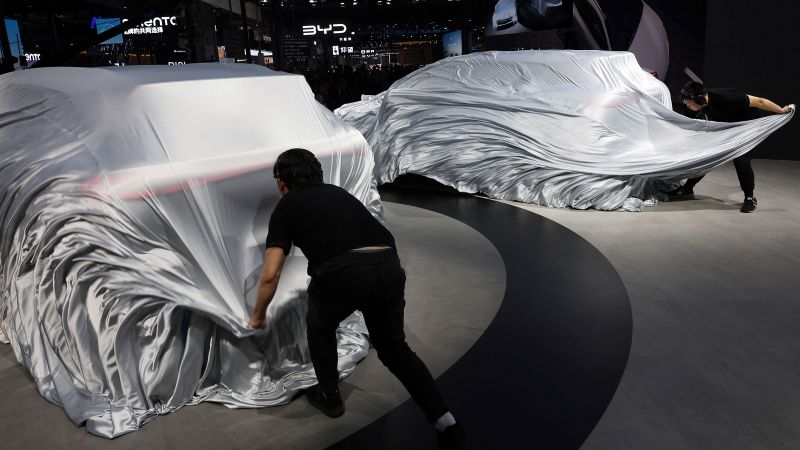The recent Shanghai Auto Show has unabashedly proclaimed China’s emergence as a vanguard in automotive innovation on the global stage. Over the course of two weeks, this grand exhibition, sprawling across an area equivalent to more than 60 football fields, showcased numerous car manufacturers unveiling an impressive array of new vehicle models. Against a backdrop of pulsating music and electrifying energy, the event revealed electric vehicle (EV) prototypes and concepts tailored to capture the imagination, emphasizing China’s significant strides in technological advancements.
A stark contrast to previous auto shows where renowned legacy brands like General Motors, Volkswagen, or BMW dominated, this year saw China’s homegrown EV manufacturers, such as BYD and NIO, attracting rapt attention. The spotlight was particularly on BYD’s hotly awaited Denza Z electric sportscar, revealed in a spectacle that featured Wolfgang Egger—a former designer for Audi and Lamborghini—defiantly stating that the car embodied “pure emotional design” and “extreme performance.” This sentiment resonated with the audience, emphasizing a cultural shift in perception toward domestic automobiles.
Beyond the main stage reveals, attendees encountered lines outside venues for glimpses of cutting-edge vehicles fueled by technological advancements, such as those engineered by Xiaomi, which is relatively new to the automotive game. Other models exhibited by NIO promised a luxurious experience, rivaling high-end European sedans like BMW’s 7-Series and Porsche’s Panamera. This environment of fierce competition and innovation also served as a reminder of the global automotive industry’s complexities, including existing trade tensions, tariffs introduced by the United States, and the repercussions of ongoing geopolitical strife.
In this context, the ascendance of China’s EV sector is not merely significant for domestic consumers; it has implications for China’s standing in global economic dynamics as it competes with the world’s largest economy. Historically viewed as manufacturers of inferior replicas, Chinese carmakers like BYD and NIO have rapidly ascended in the global market, particularly regarding EV production. BYD notably eclipsed Tesla in sales in 2022, marking a watershed moment for the industry. As the model consumer preferences shifted—favoring indigenous brands over foreign ones—China solidified its grip on more than 60% of the burgeoning global EV market.
Nevertheless, the fierce competition in China’s EV landscape catalyzes aggressive pricing wars and technological innovation. Companies are investing exorbitantly in battery technology and electric efficiency, evident when BYD unveiled a groundbreaking battery capable of providing substantial range in mere minutes. The race to outdo competition is relentless; for instance, CATL, another Chinese battery manufacturer, showcased technology that expanded battery range even further within the same charging time.
The innovation doesn’t solely center around the EV’s physical hardware; it extends to autonomous driving technology, which companies like Huawei and Momenta are continually advancing. These technological leaps reflect shifting consumer motivations—driving is as much about leisure and enjoyment as it is about utility. Automakers are now focusing on enhancing customer experience through premium entertainment systems, massage seats, and seamless smartphone integration, all at competitive prices.
However, the landscape poses its own challenges as many Chinese EV companies face overproduction without profitable margins, battling for market dominance alongside major players like BYD, which claims about 30% of China’s ‘new energy vehicle’ market. Industry experts underline that the heavy pressure to differentiate products – amid oversaturated competition – may necessitate a push into international markets for sustainable growth.
Moreover, the global reaction to China’s booming EV sector reveals apprehensions surrounding overcapacity and industrial favoritism. This scrutiny has led to trade barriers imposed by the US and Canada, seeking to contend with potentially unfair market conditions. Yet, the statistics remain favorable for Chinese EV manufacturers, who saw substantial export increases in early 2023.
Reflecting upon a transformed narrative, China’s automotive culture has evolved from one characterized by a lack of car ownership to a thriving industry within just a few decades. China’s shift from a “kingdom of bicycles” to a leading electric vehicle market has been underpinned by governmental policies, substantial investment in technology and infrastructure, and the relentless drive of entrepreneurial spirits like BYD’s Wang Chuanfu.
As the competition continues to intensify, foreign companies are now eager to collaborate with Chinese firms to leverage their innovations and recapture market share. Companies like Volkswagen, Toyota, and General Motors are ramping up their local investments and forging alliances to remain relevant amidst changing consumer expectations.
This evolving landscape symbolizes not just a shift in automotive designs and technology but reflects broader geopolitical dynamics wherein the fates of the Chinese and American automotive industries might draw starkly different trajectories based on their respective strategic directions and capabilities in fostering innovation. What remains to be seen is how global partnerships reshape the automotive cosmos, as the fast-accelerating EV segment promises to define future engagements in trade, design, and regulatory pathways.



